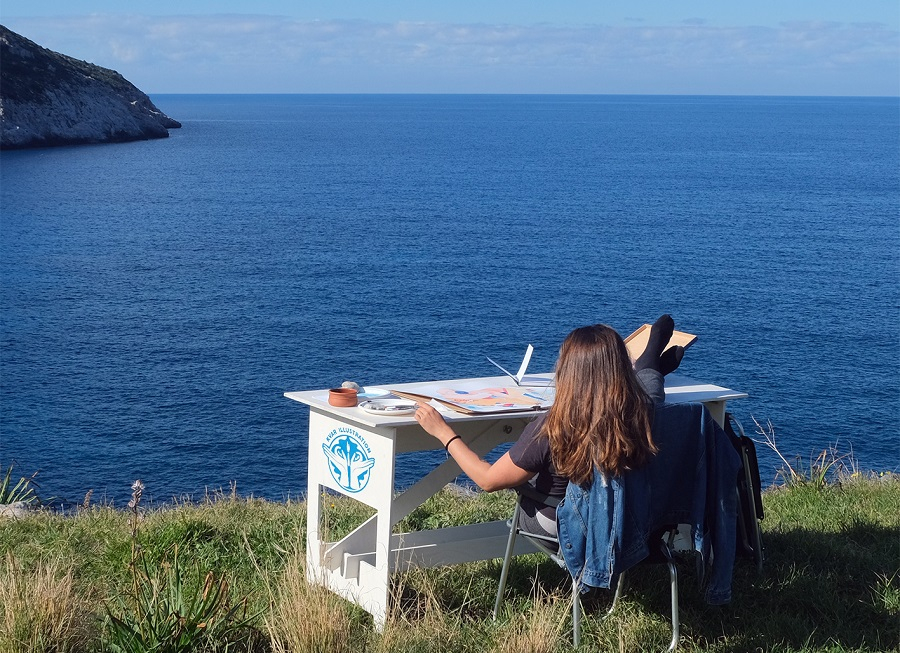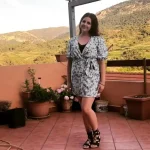Croatia, great for a 2-week holiday, but a nightmare for full-time living unless you are very rich, so the perceived wisdom goes. The Croatian dream is to live in Croatia with a nice income from abroad, as many foreigners and remote workers do. For Croatians, if I read the comments in my recent video, Croatia is the Best Place to Live: 8 Reasons Why (see below), salaries are too low and people are forced to emigrate in search of a better life.
While there is definitely an element of truth to this, it got me thinking. The era of remote work is here, and the workplace is increasingly global, with a labour shortage for many skills. It doesn’t matter if you are from Boston or Bangladesh if you have the skills, desire, and work ethic, and are able to work remotely online. And while it is certainly true that salaries in Croatia are low, what about the opportunities that the global online marketplace offers? If foreigners can find ways to live in Paradise and work remotely, why not locals? Curious, I posted this on my Facebook and LinkedIn yesterday:
Do I know many Croats who are living in Croatia, but working remotely for international companies who would be interested in being part of a TCN interview series showcasing living in Croatia but earning online, including advice to others on how to get started? It could be an interesting series. If interested, contact me on paul@total-croatia-news.com Subject Remote Croatia.
Some 15 emails – and several inspiring stories – later, and I think we have the makings of what could be a rather interesting series, Croats Living in Croatia & Earning Abroad. We start with a very determined young lady called Tea. Who would have predicted this for an artist graduating from a Croatian university in search of a job? Lesson learned – if you really want it, it is out there.
(Studio at Cite Internationale des Arts in Paris)
My name is Tea Jurišić, and I am an illustrator and muralist from Baška Voda, running a one-woman studio called KVAR Illustration. The first child of five, born in January, from an early age, I have had the urge to see what was happening around the corner. In that manner, I finished the High School of Fine Arts in Split and the Academy of Fine Arts in Zagreb, and continued with my nomadic lifestyle working in Osijek. Before I started my professional artistic career, I worked as a diving instructor for 8 years on the beautiful Croatian coast. When I became a freelancer, I realized everything is possible, so I traveled a lot, and even experienced travelling and living in a campervan with my boyfriend for two years in a row, driving through Greece, Albania, Montenegro, and Croatia. This lifestyle taught me more than all the years of formal education; I learned about different cultures, people, and nature.
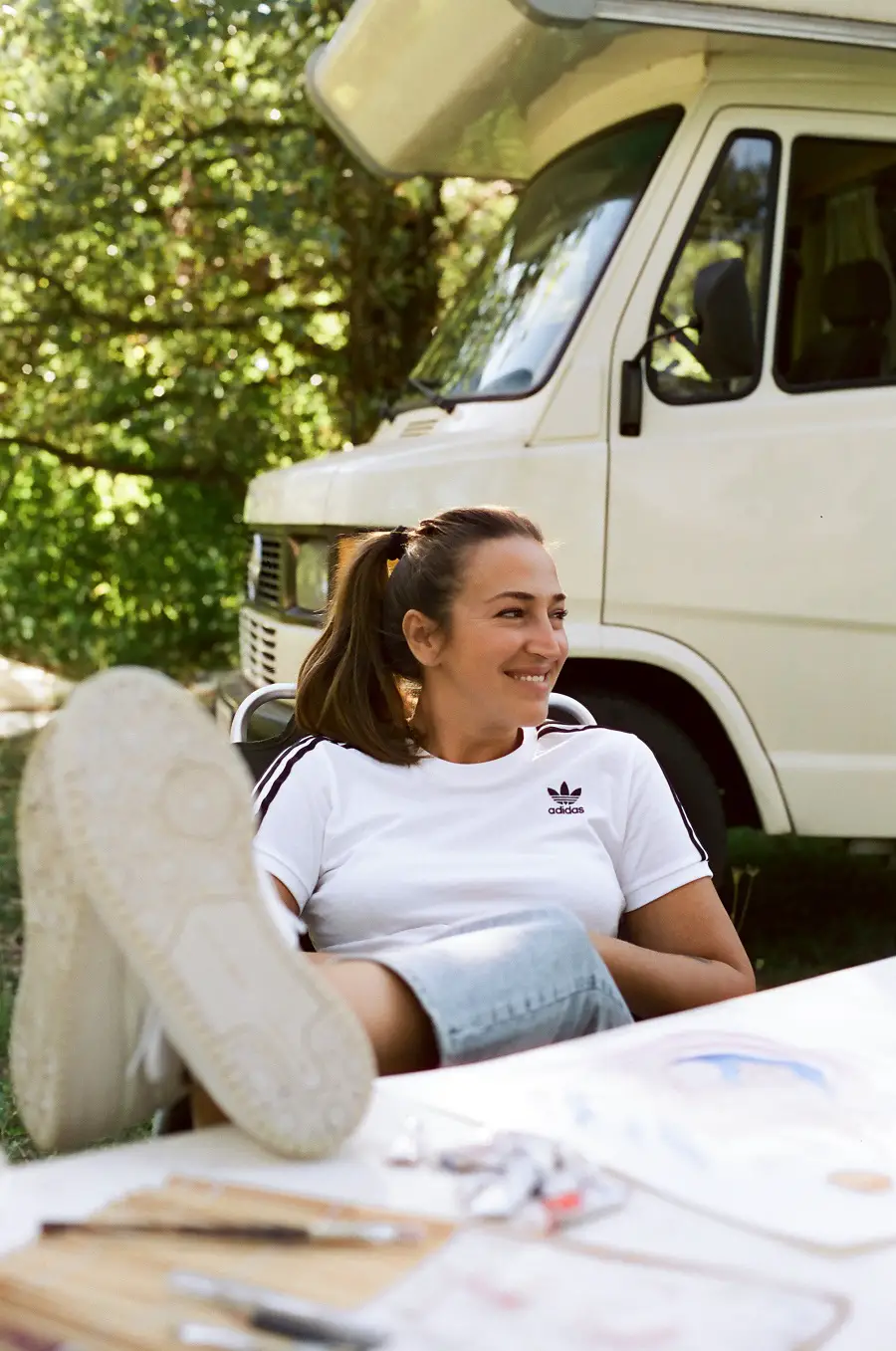
(Campaign for Adidas – 404 Agency)
For an artist, this is an unforgettable experience providing a great amount of inspiration. Last year around this time I spent 3 months at an artist residency at Cite Internationale des Arts in Paris, and at the moment, I am working and enjoying the Hafenkombinat residency in Leipzig. Some of my clients include: Adidas, L’Oreal, Samsung, Beck’s brewery, LELO, Wienerinsurance, Adris Group, Ozujsko, and many more.
Looking for jobs upon graduation can be a challenging task. How challenging was it for you to get where you are today – it must have taken a lot of determination and rejection.
During my study, I worked a summer job as a scuba diving instructor in our family diving center on the coast. It was a great job, but I experienced it more as a job, and less as my passion. In the wintertime, I was an assistant at the Academy of Arts in Osijek. After 2 years of working at the faculty, I realized I was not made to educate other people in an academic manner. I missed freedom, and I struggled with money a lot. At one moment, I realized nobody would come to knock on my door with the request: ”Hello, is there an artist living here, we want to work with you?” I built a portfolio and started to send it to a million e-mail addresses. I accepted any work I got. At first, I experienced a lot of disappointment and unpaid hours, but since I am the first child of five siblings as well as a stubborn Dalmatian, I just decided not to get offended by the situation and rejection.
I started my own business at the worst possible time, in the first months of the lockdown, and I didn’t get support from the government. That made me even more determined to succeed, and I tried to represent myself everywhere online, I started to “iskakati iz paštete”, as we say in Croatia (literally, to pop out of the pate, or to be everywhere). Step by step, I got a few good offers from good clients, and the turning point was an offer from one fantastic Swedish company to draw illustrations for them. Since then, the tables have completely turned and people started to reach out to me. I started to work with agencies all around the globe, illustrating and joining street art projects. I am still in charge of illustration projects for my first big, Swedish client, and that is one of my favorite things to do.
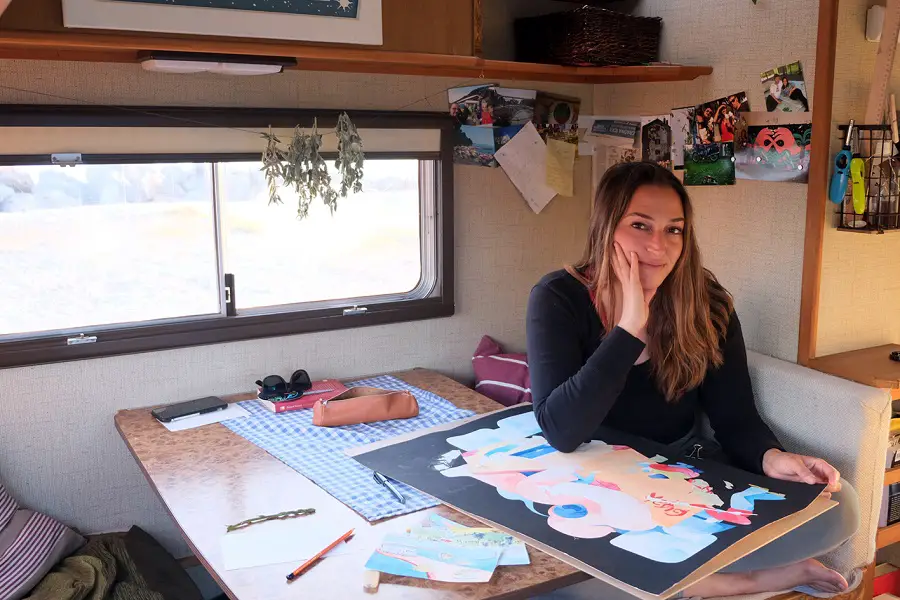
(Tiny studio in the Bercedes benz camper in Greece)
If you can do it, presumably others can too. Are you aware of others who have had similar success, but maybe in different industries?
Of course, but in the Croatian media, you will not hear about them because positive news is not interesting news.You will read about gossip, drama and lying politicians, and watch funny videos of cats and dogs. I think people are trying to escape from everyday problems by soaking in this kind of news, which makes them a little bit passive.
On the other hand, there is a constantly growing sector of many different industries with self-employed people in Croatia, especially IT, marketing, and graphic design…Even in artistic fields, my colleagues started to open businesses and invest time in education about marketing and project writing. This is not something that they are teaching you at the Academy, and that is the biggest flaw of that faculty.
People graduate, and then they are on their own, without mentors and without knowing how to represent and sell their work. However, I have seen positive growth in the last few years. People have had enough, they want to be their own bosses rather than working for companies that would pay them peanuts.

(A recent collaboration with BITE ART & Design Studio Izvorka Juric – Photos DB Izvorka Juric)
What is the general feeling among young people in Croatia today: Is it possible to have a good life here, or is the grass greener on the other side?
Croatian people are sometimes suffering from low self-esteem, which doesn’t surprise me since there is a general opinion that they should grab any work offered and that they should be happy only because they have the opportunity to work. Even if that means they are totally unhappy. I think Croatia is one of the best countries in Europe to live in if you have the opportunity to work remotely. I believe Croatia has one of the best business systems in the form of “paušalni obrt.” in that case, tax is very low, and the monthly fee you pay for retirement, health, etc. is negligible in comparison to what you can earn up to 300 000 kunas (40 000 €) annually. I am saying this because people are focused on negativity, and they sometimes simply don’t know all the possibilities available. Only 30 years ago, artists had to go from door to door with their portfolios. The Internet is the best thing ever if you use it properly. Do the research, and connect with people; today you can make it from your sofa. How amazing is that?
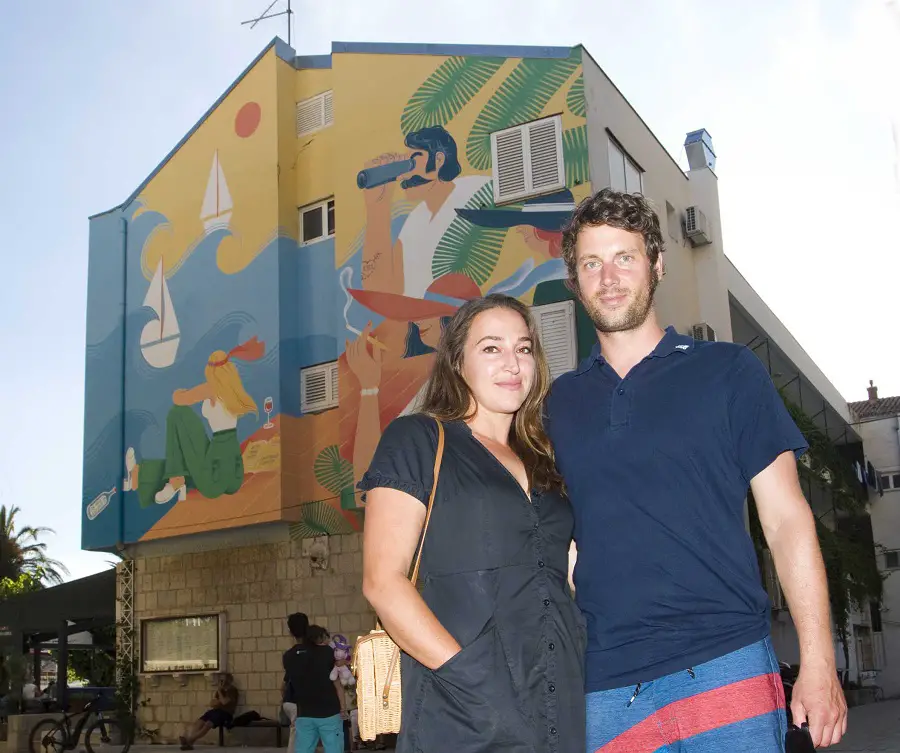
(Mural in Makarska, with boyfriend Ludwig, who assisted on the project – Photo Makarska Kronika)
Apart from corruption and nepotism, low wages are often cited as a reason to emigrate. But with the remote work revolution, as your example has shown, as well as the influx of many foreign workers to the likes of Rimac and Infobip for example, show that a good quality of life IS possible in Croatia. What are your thoughts on that?
My opinion is that Infobip and Rimac are wonderful things that happened to this country. We can learn directly from Rimac’s example – a young person who dares to take risks, who has a perfect work ethic, and who cares about his employees because he realizes how important they are. They are a team. Remote work is the future for people who like to explore other business opportunities, apart from mass tourism or being in the HDZ party.
People always think the grass is greener on the other side and that they can earn more money in Germany or Ireland. Although that may be true, in many cases, you will not have a life. I do not see myself spending the best years of my life working from 8 – 17, coming home, and not having the energy for anything else. For me, everything in life should have a good balance – work, enjoyment, and love.
Hedonism is good, and they are teaching us that laziness is a sin. It’s not if there is the right amount of it, and in many cases, “laziness” can lead you to the greatest creative solutions. One big part of my work is lying down, sitting, and resting, which for me is a synonym for thinking, because the most important part of my work is the IDEA, the idea how to create an illustration, how to paint, and how to represent the motifs metaphorically. I cannot get these ideas without resting, thinking, and looking like a lazy sloth to other people. That is, however, possible with remote work!
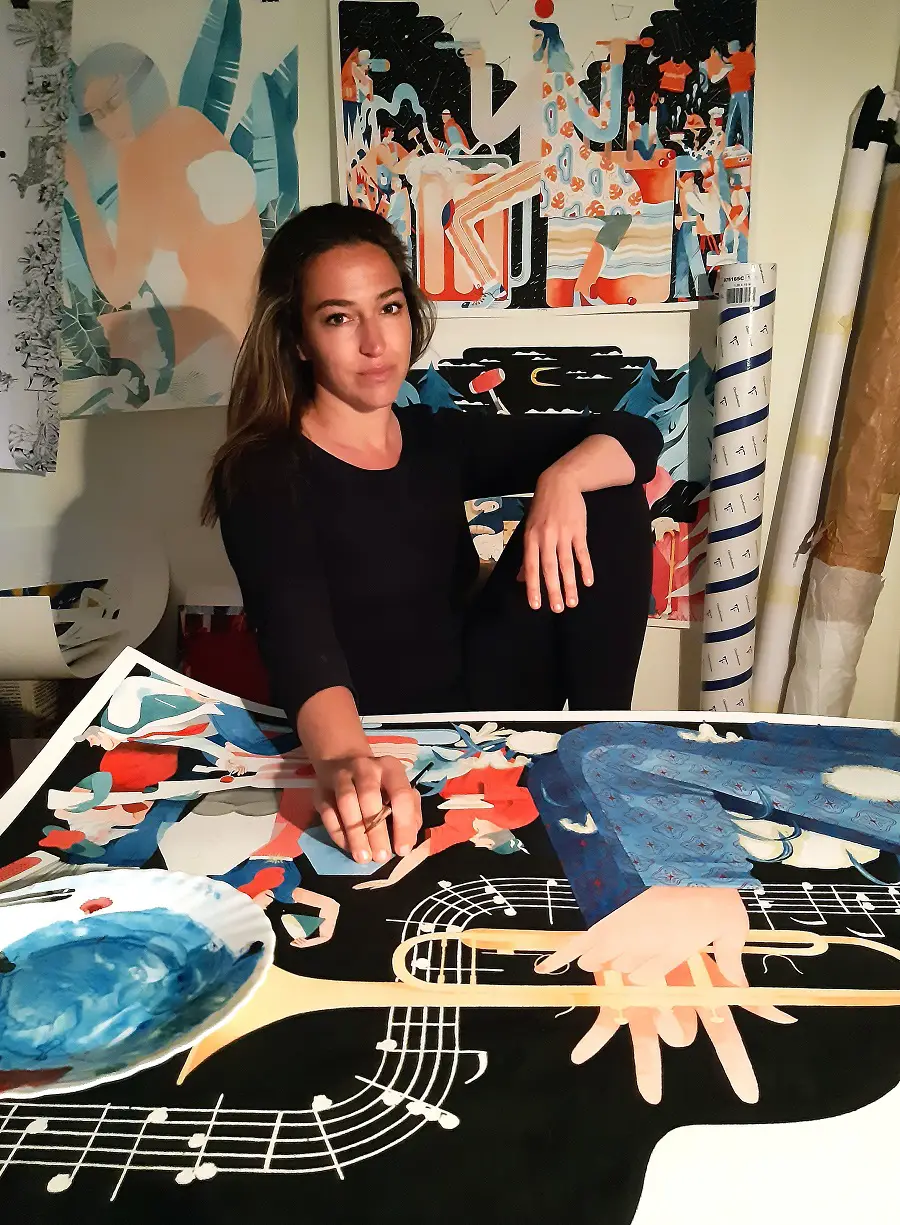
What advice do you have for others who would like to stay in Croatia, but have no idea where or how to find a possible remote work job or business as you have managed to do?
Be ready to invest a lot of time online in research and attempt to connect with people from similar branches. Learn from them. Watch tutorials on how to make an eye-catching LinkedIn profile, and how to present yourself in the best way possible. Confidence is the key. Even if you are not confident at the moment, act like you are, and soon you will become confident. Show a little bit of nerve at the right moment, you will for sure trigger reactions. Think about your unique selling points and how to show them in the best way possible. There are numerous job platforms online, check which one would fit your needs, and the moment you are satisfied with your CV and presentation, start contacting the companies you are interested in. Details are very important, learn how to write a proper e-mail which will encourage potential clients to read it.
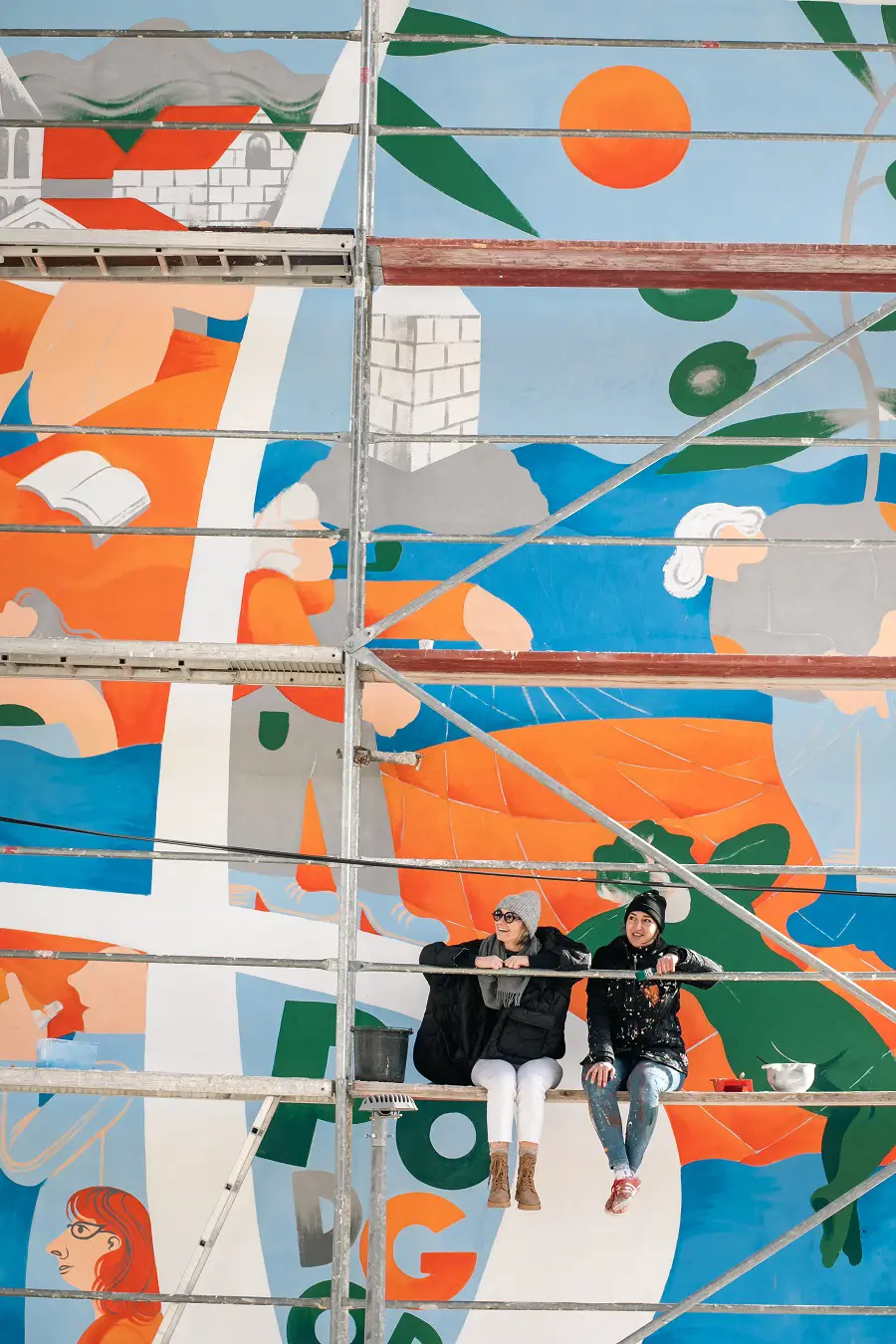
(Mural in Podgora – Photo Dario Odak)
Three reasons you decided to stay in Croatia, and the one thing you would like to change in this country.
1. Breathtaking nature, I come from the Makarska Riviera, which is the most beautiful part of the coast (sorry Istria):)
2. The lifestyle in Dalmatia. When I think of lifestyle, I do not think of having 20 apartments and doing nothing, I think about being a part of hedonism culture, slow, quality living, soaking in the beautiful sun, appreciating nature and the healing sea. Sometimes we do not stop to appreciate the heaven we live in.
3. Ćevapi
I would like to change the general mood of not forgiving other people’s success in Croatia. That is one nasty, childish habit among the people here. A lot of them simply don’t understand that other, positive business examples can lead to their own growth and new experiences. Successful people are not your enemies but an opportunity to be inspired to make something of your own.
****
Thanks Tea, very inspiring, and congratulations on all your success. You can connect to Tea via her LinkedIn, Instagram, and website.
www.linkedin.com/in/teajurisic/ www.behance.net/kvar www.instagram.com/tea_jurisic/
If you would like to contribute your story to this series, please contact paul@total-croatia-news.com Subject Remote Croatia.
****
What is it like to live in Croatia? An expat for 20 years, you can follow my series, 20 Ways Croatia Changed Me in 20 Years, starting at the beginning – Business and Dalmatia.
Follow Paul Bradbury on LinkedIn.
Subscribe to the Paul Bradbury Croatia & Balkan Expert YouTube channel.
Croatia, a Survival Kit for Foreigners is now available on Amazon in paperback and on Kindle.


